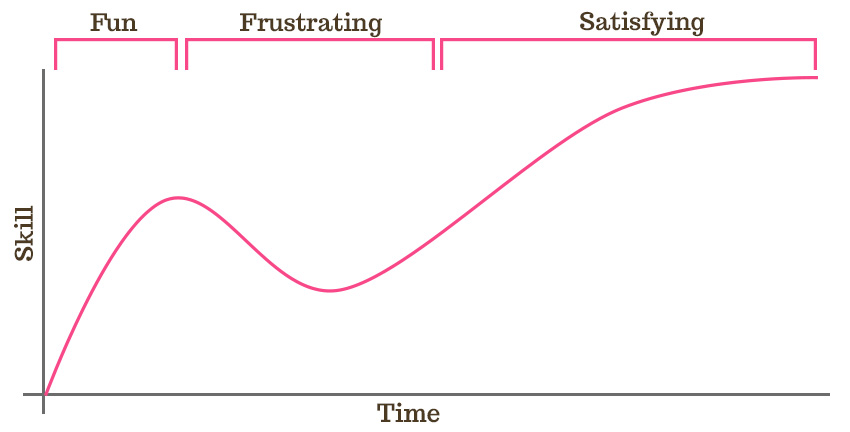The foundation dilemma: A story about how much time to invest in learning.
When I was in college and first introduced to beer pong, the advice I got about getting it in the cup was to just not think about it.
I rebelled at first and paid the price (by losing).
They were right.
When I was in college and first introduced to beer pong, the advice I got about getting it in the cup was to just not think about it.
I rebelled at first and paid the price (by losing).
They were right.
Kind of.
At first, you'll definitely overthink it.
Later, with lots of deliberate practice, you'll do better with concentration than without.
Most people don't deliberately practice beer pong, though. :)
At first, you'll definitely overthink it.
Later, with lots of deliberate practice, you'll do better with concentration than without.
Most people don't deliberately practice beer pong, though. :)
Before that, in 3rd grade, I was being taught how to juggle.
They had us start by just passing a ball from one hand to another, focusing on the nitty-gritty, boring stuff like posture, technique, etc.
I hated it. I wanted to get to the cool stuff ASAP.
They had us start by just passing a ball from one hand to another, focusing on the nitty-gritty, boring stuff like posture, technique, etc.
I hated it. I wanted to get to the cool stuff ASAP.
So I did! I learned to do all the cool tricks.
But, I noticed two problems:
First, learning these tricks was really hard.
Second, when I finished learning them, I was incredibly inconsistent (sometimes I could do it for a few seconds, sometimes a few minutes).
But, I noticed two problems:
First, learning these tricks was really hard.
Second, when I finished learning them, I was incredibly inconsistent (sometimes I could do it for a few seconds, sometimes a few minutes).
These turned out to be the same problem: skimming over the fundamentals.
Now, I presented this as a problem, but is it?
You could argue that, if my goal was to quickly learn something to impress my elementary school kid friends, then I succeeded.
Now, I presented this as a problem, but is it?
You could argue that, if my goal was to quickly learn something to impress my elementary school kid friends, then I succeeded.
This leads me to something I call the foundation dilemma: how well should you learn the fundamentals of a domain or skill?
On one hand, if you're solving a one-off or otherwise unimportant problem, it makes little sense to invest a lot of time (e.g. beer pong).
On one hand, if you're solving a one-off or otherwise unimportant problem, it makes little sense to invest a lot of time (e.g. beer pong).
On the other hand, if you plan on deeply specializing, learning the fundamentals cold makes a lot of sense.
Unfortunately, lots of problems lie in between those two extremes.
In fact, most problems exist outside of that spectrum.
Unfortunately, lots of problems lie in between those two extremes.
In fact, most problems exist outside of that spectrum.
Maybe it's one-off but *really important* (like buying a house).
Maybe you think it's unimportant but it turns out useful later.
Hence, the foundation dilemma: how much should I be learning?
Maybe you think it's unimportant but it turns out useful later.
Hence, the foundation dilemma: how much should I be learning?
A hard question to answer on a case-by-case basis, but so far I like @naval's advice:
Go hard on the fundamentals for the skills you can't go wrong learning, like writing, coding, and sales.
Go hard on the fundamentals for the skills you can't go wrong learning, like writing, coding, and sales.
For everything else, gather as much information as possible before deciding how much time to invest.
Note that gathering this information will likely require investing some time anyhow.
Oh, and don't do it to impress your friends like me. Stupid games, stupid prizes. :)
Note that gathering this information will likely require investing some time anyhow.
Oh, and don't do it to impress your friends like me. Stupid games, stupid prizes. :)

 Read on Twitter
Read on Twitter



